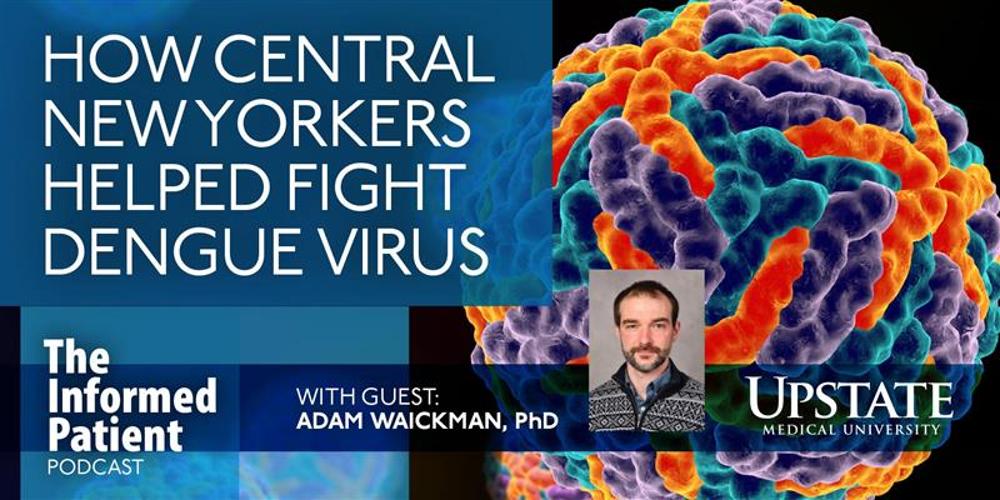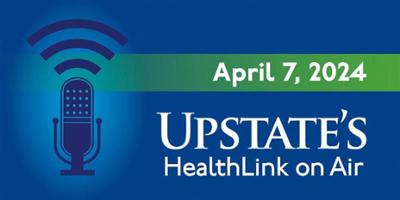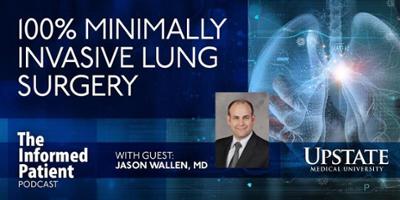
Work toward a dengue virus vaccine involved Syracuse volunteers
Dengue virus is not commonly found in the continental U.S., but the mosquitoes that spread the disease are expanding into parts of the South and Southwestern United States. This is a disease that can cause mild flu-like symptoms in some people, and life-threatening hemorrhagic fever in others. Adam Waickman, PhD, tells about the progress that’s been made -- with help from Central New Yorkers -- toward finding a possible treatment or vaccine. Waickman is an assistant professor of microbiology and immunology at Upstate.
Transcript
[00:00:00] Host Amber Smith: Upstate Medical University in Syracuse, New York invites you to be "The Informed Patient" with the podcast that features experts from Central New York's only academic medical center. I'm your host. Amber Smith. Dengue virus is not commonly found in the continental U.S. But the mosquitoes that spread the disease are expanding into parts of the south and southwestern United States. This is a disease that can cause mild flu-like symptoms in some people, and life-threatening hemorrhagic fever in others. Scientists are trying to develop treatments or a vaccine that would offer protection against the various types of dengue virus. My guest is Dr. Adam Waickman. He's an assistant professor of microbiology and immunology at Upstate who will tell us about some progress that's been made with help from Central New Yorkers. Welcome back to "The Informed Patient," Dr. Waickman.
[00:00:53] Adam Waickman, PhD: Good afternoon, Amber. Thank you.
[00:00:56] Host Amber Smith: A while ago, your team was recruiting people to help test an experimental dengue human infection model. What is this model used for?
[00:01:06] Adam Waickman, PhD: This model is used for two main reasons. One, this is a way that we can understand some of the very early immunologic and virologic features of a dengue virus infection that we're not really able to capture in the wild. Like most viral infections, you don't really know you're sick until, basically, the disease has really taken off and has run the majority of its course. So we don't have a great understanding of what you look like, what the immunologic, what's your body's doing during the first few days or first week of a dengue virus infection.
And this is notable because there's about 400 million people who are infected with dengue virus every year, but we still know very little, or we don't understand much at all, about those early symptoms and early events that happen when you're infected. So this model, the first thing we're trying to use it for is to understand what happens in those first few days and first week after you're infected.
And the second reason we're developing this model is to have a tool for us to be able to test drugs and test vaccines and other therapies in order to understand if they're going to be useful in the field, doing a small controlled study in a controlled setting before we expand to a large study in endemic areas.
[00:02:24] Host Amber Smith: So is this study ongoing, or is it finished?
[00:02:27] Adam Waickman, PhD: We've completed several human infection studies over the last decade here at Upstate, but we are actively recruiting and actively performing more studies as we go. We've performed the initial characterization and the initial safety studies associated with these models, and now we're really putting them to what we consider good use. We're now using them to test drugs and test vaccines to hopefully get a handle and get a set of tools that we can use as a medical community to control and help prevent disease and illness and death from dengue virus.
[00:03:00] Host Amber Smith: So how many people from Central New York have volunteered toward this?
[00:03:05] Adam Waickman, PhD: We've had nearly 40 volunteers from Central New York participate in these studies. This has been over the last decade or so, about eight or nine years, and the Central New York community has been incredibly generous with their time in this effort.
We've actually had a recent study where we've called back or asked people who participated in studies five, six years ago, and they've come back and rejoined the studies to allow us to do more in-depth analysis that we weren't able to do at those initial studies. So this has been a long and very productive collaboration between Upstate and the central New York community.
[00:03:44] Host Amber Smith: What do the volunteers do?
[00:03:46] Adam Waickman, PhD: So the volunteers -- the first thing, if you're interested in volunteering or participating in one of these studies, we have you come in for a visit. We explain what the features of dengue, what you might expect if you'reenrolled or exposed as part of this study. And then if you are given the green light, if you meet all the enrollment criteria for the study, you will be injected with this attenuated strain of dengue virus.
And what you'll do is, you'll have blood draws. We have, for the first two weeks, two and a half weeks, we have a pretty intensive blood draw schedule where we're collecting blood. And now we're also collecting specimens like saliva to be able to understand what your body's doing in response to that infection. And if you're given a drug or vaccine, if that drug or vaccine is having an effect on the infection.
And then after that first two, two and a half week period, there's a few other follow-up visits just to make sure that your body has handled and cleared the virus appropriately. But it's mostly a two and a half week intensive experience, and then after that, a few follow up visits.
[00:04:50] Host Amber Smith: So what is the benefit to doing a study like this here in Syracuse versus traveling to wherever dengue is endemic and studying people in that community?
[00:05:02] Adam Waickman, PhD: That's a great question. Obviously anything that we test using the human infection model -- any vaccine or any drug -- we would then have to go on to test in an area where dengue is found naturally to make sure that you have impact on the full natural disease.
But the reason we're doing these studies in Central New York, one is that we don't have the mosquitoes that can transmit the disease. So when you're infected, you don't have to worry about spreading the virus to people who live nearby. We do, during the summer, take extreme precautions and ask the volunteers to stay inside during the window where they would be infectious if they were in a region with the mosquito -- the Aedes aegypti and Aedes albopictus -- mosquitoes could be found. So that's one primary reason.
[00:05:48] Host Amber Smith: And the other reason is that the vast majority of people living in Central New York haven't had dengue before. As you said in your introduction, it's a very rare disease in this part of the world, so it means everyone is going to be coming in with a clean immunologic slate, and we're able to really see what the infection looks like in someone who has never had the disease before. This is Upstate's "The Informed Patient" podcast. I'm your host, Amber Smith. I am talking with Dr. Adam Waickman, an assistant professor of microbiology and immunology at Upstate, and we're talking about research on dengue virus.
So did anything surprise you, so far, from this study?
[00:06:29] Adam Waickman, PhD: Well, we're learning all sorts of interesting and new things with dengue virus as part of this. And I think one of the more surprising things that we've learned as part of one of our more recent studies... I mentioned earlier that we've had volunteers come back from previous studies, and one of the central dogmas of dengue immunology and immunology in general is that when you're infected with one serotype of dengue -- And I should mention that we think about there being four co-circulating serotypes of dengue, and you can become sequentially infected with multiple serotypes throughout your life -- but what the field and what the medical community has shown in field studies is that it's thought that if you're infected with one serotype of dengue, you're protected for life from a subsequent infection.
But we didn't know really, does that mean you're protected from disease if you're ever exposed to that? Or are you truly protected from infection if you're re-exposed again to that same serotype? And one of the things that we've learned with this more recent study is yes, indeed you are protected from reinfection. When we have volunteers come back five years after we infected them with this very attenuated strand of dengue, they're completely protected. So this is giving us new insight into what is possible and what the immunology of a dengue infection looks like and how we might be able to exploit this to develop vaccines.
If you're infected with, let's say, dengue-1, you are protected for life against dengue-1, at least symptomatic dengue-1 infection, but you're actually at increased risk of getting infected with the other three serotypes of dengue. So this is a phenomenon called immune mediated enhancement and which is why these four strains have been able to co-circulate. You have incomplete protection from one infection, and that sets you up for increased likelihood of getting sick from the other three serotypes. But after you've had two infections, you seem to be protected for life.
That's why in most dengue endemic countries, dengue is really a childhood illness because you'll get your first infection as an infant, usually one or two years old, and you might get a little bit sick, and then you have a window during which you're protected from reinfection. But then when that window closes, you're susceptible to infection with one of the other three, and then you have your second hit, and then you're protected for life.
[00:08:56] Host Amber Smith: Assuming you survive that second hit.
[00:08:58] Adam Waickman, PhD: Assuming you would survive, which again, the thing about dengue, there are 400 million infections a year. There's only about 40,000 deaths. So it's a big ratio, but again, it's because of that need to monitor so closely. That's why it's been such a health challenge. And this is a bit of an aside, well, I mean it's important for the United States. Most of what we think we know about dengue is from that childhood experience.
Because we're seeing dengue in areas where it wasn't traditionally found, isn't traditionally found, we're seeing adults getting their primary dengue infection, and especially people over 50 or over 60. So now you're getting a dengue infection where you might have other comorbidities like diabetes or other chronic health challenges. And we're seeing a lot of new things with dengue that we haven't seen previously because again, the overwhelming burden of dengue used to be in children, and dengue in adults is a very different thing.
[00:10:02] Host Amber Smith: Which of the four dengue's have you been working on, or have you been working on all four of them?
[00:10:08] Adam Waickman, PhD: Our goal is eventually to be able to work with all four dengue serotypes. Here at Upstate, we've worked with dengue-1 and dengue-3. Our collaborators at the University of Maryland have performed studies with an attenuated dengue-4 strain. And in the next year, we're hopefully going to be standing up a dengue two challenge model as well.
So this will hopefully have really good tools for all four serotypes of dengue, so we can really get a comprehensive look and comprehensive toolbox to test drugs, test vaccines, and really understand, what's happening when you're infected with dengue.
[00:10:45] Host Amber Smith: So dengue, a person gets infected from the bite of an infected mosquito, is that right?
[00:10:51] Adam Waickman, PhD: That is correct, yes.
[00:10:52] Host Amber Smith: So has your study shown you anything more about how the virus infects humans or why one human might end up with a very mild case, and another one might die from dengue, right?
[00:11:07] Adam Waickman, PhD: We're really just starting to pull apart those layers. So our model is intended to be very mild. And about half the volunteers really have few or no symptoms. Only about half the volunteers even develop a fever. So we're nowhere near the severe manifestations of dengue, and that's very much by design. We want this to be a model where we can be able to have a idea of some of the clinical benefit on the mild end of the disease spectrum.
For dengue, most of those severe symptoms are associated when you're reinfected or you're exposed to a second serotype of dengue. And again, that's only a risk that you're seeing during a certain window after your primary infection event. So we're still trying to understand why some people are asymptomatic, they don't have any symptoms of infection, why some people have basically flu-like symptoms, and some people progress to really severe manifestations of dengue that puts you at risk of death. But, we're not quite there yet.
[00:12:12] Host Amber Smith: Once you're infected with the virus, how long is it in you?
[00:12:15] Adam Waickman, PhD: In the wild, it's a little hard to estimate. In our models, we usually start to see virus in the blood about four days after infection. And there's about four days to a week when there's virus in the blood that we can detect. And then after that, most of the symptoms actually show up toward the end of that curve when your body's really taking control. There's probably, for our specific model -- I can't say for sure what the window would be for mosquito transmission -- I could say probably a couple days.
[00:12:50] Host Amber Smith: Once a mosquito bites you and infects you, can that mosquito keep biting other people, or not?
[00:12:57] Adam Waickman, PhD: Mosquitoes are, especially these Aedes mosquitoes are quite promiscuous feeders, so they can feed on multiple people sequentially. When an uninfected mosquito feeds on you and you are infected, it'll take about 10 days for that mosquito to become infected and then transmit on. But then it can potentially transmit to multiple people.
In our studies and also in the wild, you get infected, you have virus for about one or two weeks, and then it's gone. So after it's cleared, you'll have the antibodies from that virus, but there isn't any other infectious material left. So if a mosquito feeds on you, it's not going to be, there's nothing to infect the mosquito.
[00:13:41] Host Amber Smith: So could the mosquito pick up the antibodies of the recovered patient and then somehow transmit those to the next person they bite?
[00:13:51] Adam Waickman, PhD: No, I wish. Unfortunately not. The mosquito takes up the blood meal, and that goes into the midgut of the mosquito. And if there's virus in the blood meal, it actually has to get out of the midgut and back to the salivary glands before it can infect. So that's why there's, it's that extrinsic, it's called the extrinsic incubation period, about the time that it takes from the virus to get from the blood meal out of the midgut, up to the salivary gland because it's that salivary gland spit that's actually the infectious part of the interaction. So because the antibodies don't have a way to get out of that mid gut and back to the salivary gland. It's a very active process, active from the standpoint of a virus, to get out and then back into the saliva. So there's not a mechanism for mosquitoes. What's injected is primarily those salivary gland proteins, not anything that's from the midgut.
[00:14:55] Host Amber Smith: Well, if ultimately what we want is a vaccine to protect people from dengue, are we going to need four different vaccines, one for each type? Or is the hope to create a single vaccine that would cover all four?
[00:15:11] Adam Waickman, PhD: It's kind of a mixture of both of those options. So the vaccines that are currently either available or are nearing licensure, it's actually a vaccine that contains four different virus components. Our challenge strain was actually derived from a vaccine strain that was designed or intended to provide immunity but was deemed to be a little bit too hot, gave people a little bit too many symptoms after they were inoculated. But there's other groups, other companies that have taken this idea of attenuating or weakening the virus strains so that you get immunity, but you don't get symptoms.
And all the vaccine products that are either, as I said, available or near in licensure, it's an injection with four separate vaccine components. So all four dengue serotypes, administered at once. So it's basically a mixture of both. It's one vaccine. The hope is to have one injection, but have those administered at one time.
[00:16:11] Host Amber Smith: Well, at this point, do we have treatments for someone who becomes infected with dengue?
[00:16:18] Adam Waickman, PhD: So that's really the challenging thing with dengue is that we do not have any direct acting antivirals. We have no antivirals. We have no monoclonal antibody therapies. Luckily, the mortality rate for dengue is quite low when you have proper supportive care. So the greatest risk, what people die from with dengue is when you go into shock and you're no longer able to regulate your blood pressure. And if you're in the hospital, and the doctors at the hospital know how to handle dengue, you're probability of dying is quite low.
But there's no way for us to predict, if you come in with dengue-like symptoms, whether or not you're going to progress to severe dengue, or if you're going to have just a normal run-of-the-mill dengue, where you feel sick for a couple days, but then you recover. So one of the reasons why dengue is such a burden on healthcare systems around the world is that many countries just by default, admit people that come in with dengue symptoms so they can keep an eye on them and administer the fluids and other supportive care that are needed to prevent you from developing those severe symptoms or protect you from death if you develop those severe symptoms.
So despite the fact that yes, we can provide supportive care, we don't have any drugs that can help treat dengue, like we have for some other viral diseases, but hopefully those are on the way.
[00:17:40] Host Amber Smith: Do you know, are researchers pursuing any particular strategy for treatments?
[00:17:46] Adam Waickman, PhD: There's multiple strategies that are being pursued to try to control dengue. So one is, obviously, the generation and administration of vaccines. Vaccines are going to be the most effective and cost efficient way to prevent dengue, true for almost any infectious disease.
The second is that there are efforts to try to control the mosquitoes that are capable of transmitting the disease. This is hard to do. It doesn't take many mosquitoes to transmit dengue, so it's a significant challenge.
But then third, obviously, there's interest in developing antivirals that can help either prevent infection if you take them before you're exposed, or reduce the duration of symptoms if you are exposed. And there are multiple companies and multiple research groups that are trying, especially, that last option, the antiviral compounds, and there's a lot of action in that area. We're hopefully going to be seeing something in the next few years.
[00:18:37] Host Amber Smith: Well, I'm curious about the dengue human infection model that Central New Yorkers worked on here. Do you know, are there vaccine makers or drug makers that are making use of this at this point?
[00:18:49] Adam Waickman, PhD: Yes. So there are multiple drug and vaccine manufacturers who are using, or who are going to be using this model.
[00:18:56] Host Amber Smith: Do you think that there's a need for additional work on a human infection model in the future?
[00:19:01] Adam Waickman, PhD: I think there's always going to be a need to update the human infection model portfolio. So as I mentioned, we have a good set of dengue-1, -3, and -4 viruses in our portfolio. And we're actively working to stand up a dengue-2 challenge model. The one caveat with these models is that these viruses were derived from isolates that were originally harvested from the wild in the 1970s. So, these are great tools, but again, there may be need to update the portfolio to better represent the viruses that are currently circulating. And this is an ongoing challenge for any human challenge model or any countermeasure development effort.
[00:19:43] Host Amber Smith: Is there a website or a phone number if listeners are interested in potentially participating?
[00:19:50] Adam Waickman, PhD: Anyone who would be interested in learning more about the Dengue Human Infection Trial, or potentially volunteering for the study or any other study, you can find more information on our website, upstate.edu/globalhealth, or you can reach out to our lead recruitment specialists at [email protected], or by phone at (315) 464-7681.
[00:20:19] Host Amber Smith: Well, Dr. Waickman, thank you so much for making time for this interview.
[00:20:23] Adam Waickman, PhD: It's been a pleasure. Thank you for your time.
[00:20:25] Host Amber Smith: My guest has been Dr. Adam Waickman. He's an assistant professor of microbiology and immunology at Upstate. "The Informed Patient" is a podcast covering health, science and medicine, brought to you by Upstate Medical University in Syracuse, New York, and produced by Jim Howe. Find our archive of previous episodes at upstate.edu/informed. If you enjoyed this episode, please tell a friend to listen too. And you can rate and review "The Informed Patient" podcast on Spotify, Apple podcasts, YouTube, or wherever you tune in. This is your host, Amber Smith, thanking you for listening.




